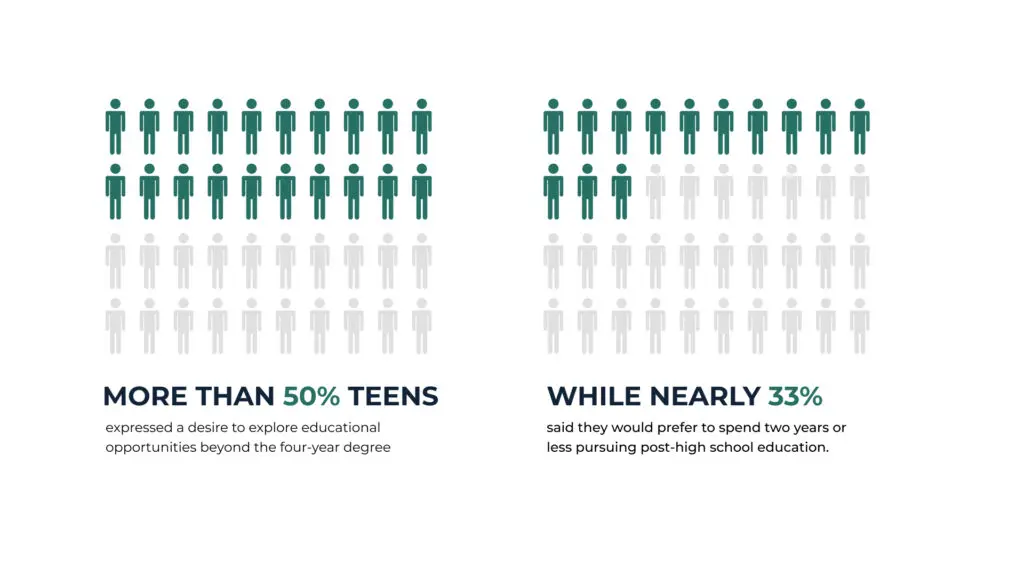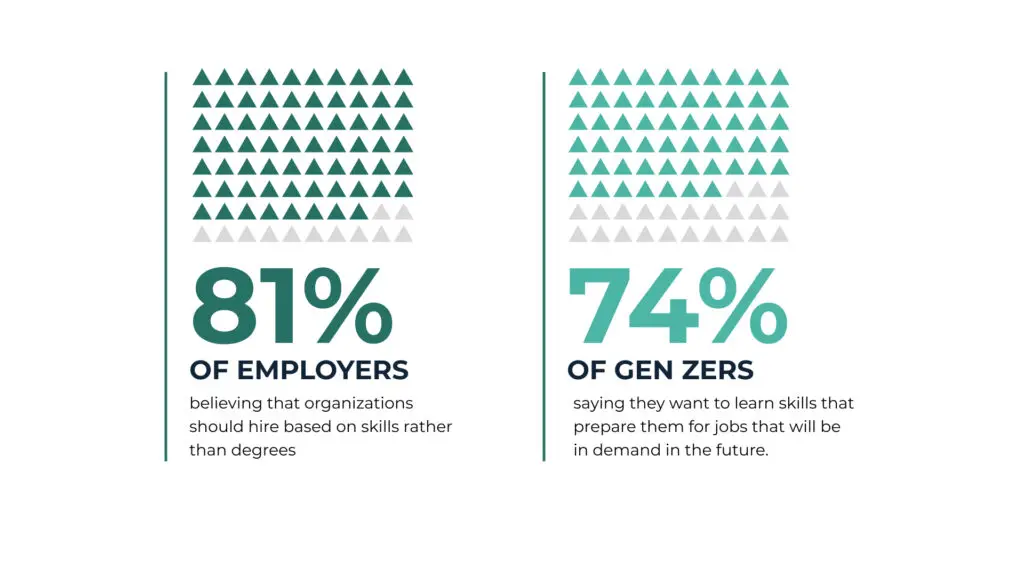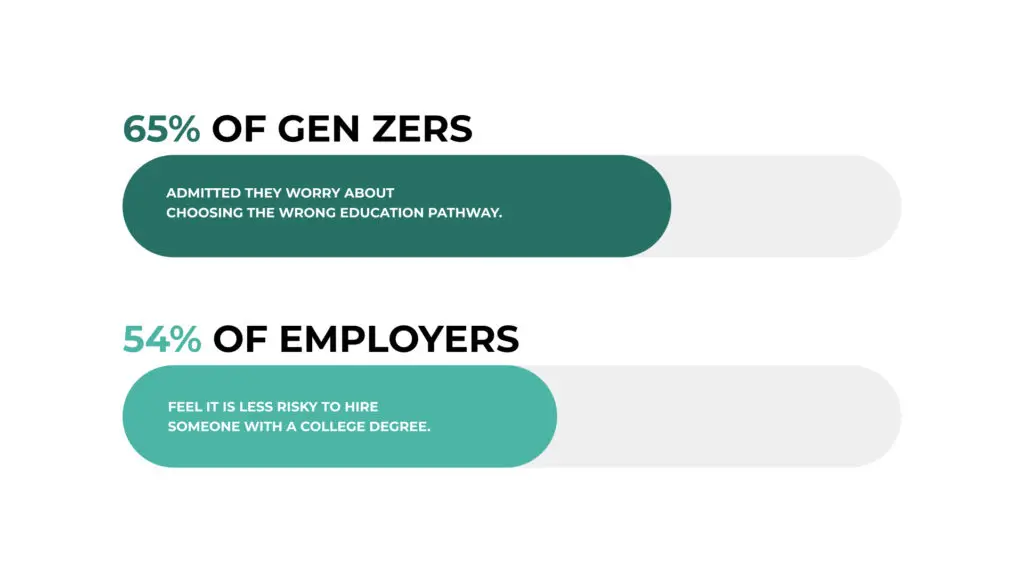For the past few years, stories proclaiming Generation Z’s growing disinterest in traditional four-year college degrees, coupled with increased interest in associate degrees and trade school programs, have regularly appeared in respected higher education forums and news outlets worldwide.
While this trend was ostensibly kick-started during the coronavirus pandemic, postsecondary enrollment was already on the downswing due to the declining number of high school graduates and the perceived diminishing return on investment of a college degree.
A February report from the National Student Clearinghouse Research Center indicates that even as undergraduate enrollment began to stabilize in fall 2022, it is still down some 1.23 million, compared to fall 2019, and remains well below pre-pandemic levels.
Similarly, the NSCRC reported in mid-March that undergraduate credential completions in academic year 2021-22 fell for the first time in a decade, down by 1.6% from the previous year. While associate degree earners fell more than baccalaureates among first-time graduates, 9% more students earned a certificate, a significant indicator of shifting attitudes toward degree work. In a related, revealing trend, searches for “trade school programs” have increased 22% since December 2022, according to a Google Keyword Planner search (March 2023).
In NSCRC’s more-recent research, preliminary data from September suggests that the decline in undergraduate enrollment has slowed to nearly pre-pandemic rates; but over a two-year period, institutions experienced a 4.2% decline in undergraduate enrollment since 2020, especially at four-year institutions. Conversely, traditional-age college students and dual-enrolled high school students have actively pursued associate degrees at community colleges, where declines in enrollment have slowed considerably.
In light of these findings, a case could be made that the rising popularity of certificate and skills-based programs and trade schools and the growing enrollments at community colleges point to Gen Z’s unwillingness to take on significant educational debt and their efforts to find more-economical means to pursue a stable career.
Gen Z Teens Approve of Career-Connected Pathways
A May 2022 report from the ECMC Group, a nonprofit corporation focused on helping students succeed, reveals that Gen Z teenagers are open to less-traditional degrees and “shorter, less expensive, more direct-to-career pathways in high-demand industries.”
As part of ECMC’s Question The Quo public awareness campaign, which encourages students to explore the range of education options available, five online surveys of some 5,300 U.S. high school students were conducted in partnership with VICE Media between February 2020 and January 2022.
The data sets found that Gen Z teens are highly interested in programs geared toward skills development and career preparation, as well as alternative educational options, such as career and technical education, apprenticeships, and entrepreneurship.

In keeping with generational attitudes, more than 50% of the teens expressed a desire to explore educational opportunities beyond the four-year degree, while nearly 33% said they would prefer to spend two years or less pursuing post-high school education. Despite feeling pressure to pursue a four-year degree, the majority of the teens surveyed said they “prefer learning hands-on skills either in a lab/classroom or through on-the-job experiences.”
These findings correlate with the 20 percentage-point decrease in the number of students considering four-year college programs and the nearly 10 percentage-point drop in the number of students who believe that education beyond high school is necessary.
Beyond being markedly averse to student debt, Gen Z teens reveal “a keen understanding of the need for skills-based training and lifelong learning, which are integral to succeeding now and in the future,” said Jeremy Wheaton, the president and CEO of the ECMC Group.
Gen Z Uncertainties about Non-degree Pathways
As college enrollment declines and Gen Zers continue to question the value of higher education relative to its cost, assessments of the concept of employability have undergone a shift, and serious conversations around non-degree pathways have emerged.
A collaboration between American Student Assistance and Jobs for the Future set out to measure the viability of other paths to success beyond solely the four-year degree. The partnership produced Degrees of Risk, a September 2022 study assessing the many facets of employability and pinpointing high-quality professional and educational paths that can benefit students, as well as employers struggling to fill positions with talented candidates.
Responses from employers and Gen Z students alike confirmed acceptance of skills-based preparation as a practical alternative to a four-year degree, with 81% of employers believing that organizations should hire based on skills rather than degrees, and 74% of Gen Zers saying they want to learn skills that prepare them for jobs that will be in demand in the future.

However, even as the survey respondents were generally aware of the range of postsecondary education programs, they expressed uncertainty about these options and a hesitancy to pursue them. For example, 65% of Gen Zers admitted they worry about choosing the wrong education pathway, while 54% of employers feel it is less risky to hire someone with a college degree.
Put simply, the four-year degree still holds sway as a known entity, and more work is needed to increase awareness and understanding of non-degree pathways so that they may become universally accepted.

Gen Z Is Rethinking Higher Education
Gen Zers value education, but they continue to question the four-year degree as the sole postsecondary option, a shift in perception that evolved during the pandemic and subsequent rise in inflation. As witnesses to financial instability in their families and among older generations, they are acutely aware of educational costs and debt, and they seek safe pathways to secure, well-paying jobs with potential for career growth.
According to November 2022 research conducted by Ologie, a marketing and branding agency dedicated to advancing education, Gen Zers are rethinking higher education, how they interact with it, and what they want from it. Similarly, Niche and Tudor Collegiate Strategies’ 2021 survey of 12,000 members of the entering class of 2022 found that 75% refused to consider certain higher education institutions based on the total published cost, a figure that rises to 78% for first-generation students and to 79% for low-income students.
In response, four-year colleges have become more transparent, proactively sharing exactly where each tuition dollar goes. Nonetheless, Gen Z students still question the cost, making it clear that institutions must persistently and persuasively communicate the return on investment of a four-year degree.
Tips for Demonstrating ROI of Four-Year Degrees
- Use U.S. Bureau of Labor Statistics as a starting point to demonstrate the salary differences for those with and without degrees (in general and by industry)
- Share projected job growth data from U.S. BLS
- Collect and share data on your own graduates by program and in general
- Use infographics to communicate this data
- Consider creating an ROI calculator like Wharton’s for your institution
- Use a combination of hard data and student stories to address both the financial ROI and sense of fulfillment
Need Help?
At Viv, we frequently help colleges and universities assess their current marketing strategies to recommend a more strategic alignment with emerging trends, enrollment data, and institutional goals. You can learn more about how we’re preparing our clients for the future here.
